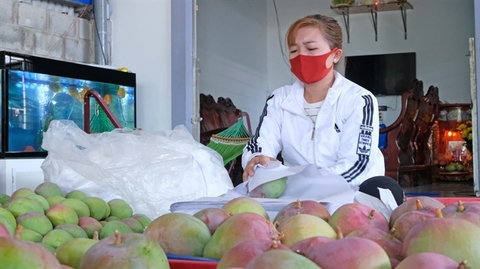
Mango being packed before shipping to China in Khanh Hoa Province's Cao Lam District. — VNA/VNS Photo Nguyen Dung
Viet Nam recorded a trade surplus of US$2.8 billion in the first quarter of this year, higher than $1.5 billion seen in the same period last year despite the COVID-19 pandemic sweeping its major export markets.
The domestic sector posted a trade deficit of $4.4 billion while the foreign-invested sector witnessed a trade surplus of $7.2 billion, the General Statistics Office (GSO) has said in its monthly report.
The country’s export turnover was estimated at $59.08 billion during the period, up 1 per cent year-on-year. The export value of the domestic sector saw a year-on-year increase of 8.7 per cent to $18.65 billion, accounting for 31 per cent of the country's exports. Meanwhile, the foreign-invested sector reaped $40.43 billion from overseas shipments, down 3 per cent year-on-year and making up 69 per cent of the total.
Eight groups of commodities saw export turnover surpassing the $1-billion benchmark during the period, accounting for 71 per cent of the total. Of them, phones and parts earned the largest export turnover of $12.4 billion, accounting for 21 per cent of the nation’s total exports.
Electronic products, computers and components ranked second with $8.2 billion, up 16.2 per cent year-on-year, followed by garments with $6.5 billion, down 9 per cent; equipment and parts ($4.7 billion, up 18 per cent) and footwear ($3.9 billion, down 2 per cent), besides wood and wooden products ($2.5 billion, up 9.5 per cent); transportation vehicles ($2 billion, down 6 per cent) and seafood ($1.6 billion, down 11.2 per cent).
From January to March, the US remained the largest importer of Vietnamese goods with a value of $15.5 billion, a yearly hike of 16.2 per cent. It was followed by China with $8.4 billion, up 12 per cent; the EU ($7.5 billion, down 15 per cent); ASEAN ($6 billion, down 5.2 per cent); Japan ($4.8 billion, up 4 per cent) and South Korea ($4.5 billion, down 3 per cent).
Meanwhile, the country spent $56.26 billion in three-month imports, decreasing 2 per cent compared to last year’s corresponding period, the GSO said.
Production materials were bought for an estimated $52.6 billion, down 1.2 per cent year-on-year and equivalent to 93.5 per cent of the total import value while expenditure on consumer goods stood at $3.66 billion, down 11 per cent, accounting for 6.5 per cent of the total.
In the three-month period, China retained its position as Viet Nam’s largest provider of goods with a turnover of $13.3 billion, down 18 per cent year-on-year. South Korea came next with $11.7 billion, up 2.5 per cent, while ASEAN ranked third with $7.2 billion, down 8.3 per cent, followed by Japan ($4.9 billion, up 16 per cent); the EU ($3.4 billion, up 5.2 per cent) and the US ($3.4 billion, up 13 per cent).
The GSO predicted that once the EU-Viet Nam Free Trade Agreement (EVFTA) comes into effect, Viet Nam’s exports to the EU will surge by over 20 per cent this year and the growth will be on the rise in the following years. Seafood products are expected to benefit most from the deal.
The EU is now the second largest importer of Vietnamese seafood products, behind the US.
Viet Nam’s shipment of farm produce to the EU is also forecast to increase by around 10 per cent this year. — VNS